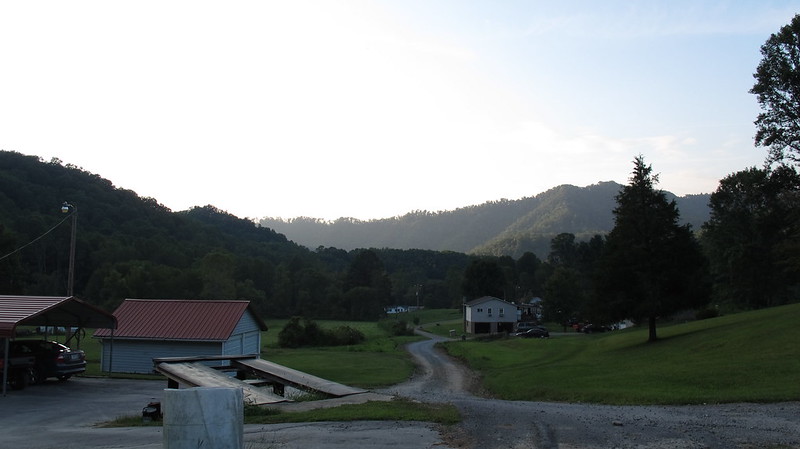
Appalachia as a refuge isn’t a new idea, but it may be growing in popularity due to COVID-19. While the public health crisis rages on, many Appalachians have an understandable concern about incoming visitors from high-infection-rate areas and have protested for folks to stop coming.
The recent news about people fleeing hotspots like New York City for rural areas has sparked a backlash from locals. Meghan Daum’s essay, “I Left New York for Greener Pastures—and a Puppy,” described her escape from New York to Virginia. Though well-intentioned, the article outraged some Appalachians on social media for presenting a happy-go-lucky version of rural life in crisis as seen through her narrow experience in an AirBnB. “While the rest of the world withers under the weight of existential horror,” Daum wrote, “my world has been reduced to an endlessly repeating cycle of eating, defecating, romping, gnawing, and, sleeping.”
Appalachia, too, is straining under the weight of existential horror even if Daum doesn’t feel it from her short-term rental. So, while a regional audience can appreciate the praise of the rural landscape and her desire to raise a puppy in open spaces, her escapism and economic privilege did not sit well with readers who feared for the health and survival of their communities.
Historian Elizabeth Catte responded with a fiery, direct article, “The Rolling Hills of Appalachia are Not Your Refuge for Coronavirus.” Catte examines Daum’s essay as part of the genre of New Yorkers who leave for rural places and eventually move back to the city. “I want to tell people who are thinking of writing essays about homesteading in vacation rentals during a global crisis to just keep it to themselves,” she wrote.
Appalachians have good reason to be upset by the mindset that sees the region as an emergency home. Doing so has brought the coronavirus to Appalachia: New York City residents’ virus spread accounts for “60 to 65 percent of the sequenced viruses” that have been detected across the country. Though many scientists are hesitant to throw their weight behind the numbers without more information, New Yorkers have undoubtedly played a major role in spreading the virus.
Some Appalachian counties, such as Graham County in western North Carolina, have pre-emptively barred outsiders from coming in to slow the spread. And the Appalachian Trail and other national parks closed in late March.
The closures were justified by the limited resources of rural hospitals and communities, and the high numbers of vulnerable populations. Rural hospitals are shutting down at alarming rates amid a global health crisis. In West Virginia, doctors are preparing for a case surge due to the higher average age of the population and limited access to treatment.
Many Appalachians who left the region have felt the pull to return home during this time, but many are resisting the urge. Many people are worried about unintentionally spreading the coronavirus. In response to the aforementioned articles by Daum and Catte, an expatalachians audience survey captured the feelings people have:
“I’m not going home for now or the foreseeable future. I might bring it with me, and resources are scarce and available for the people who live there. People just visiting are putting my loved ones at risk. It just seems selfish. You could have visited Appalachia prior to a pandemic, and if you survive, you can visit it after. But during? Now is not the time. You’re just bringing disease from the city with you, which is what a lot of my hometown folks were afraid of all along. It’s like bringing the worst of [the] city folk stereotypes to life.” —Amanda, Ohio
“West Virginia is filled with elderly and people struggling with pre-existing conditions due to lack of access to health care and the means to live a healthy life. This article was extremely tone deaf as she almost acted like it was an uninhabited area. Somehow droning [on] and on about the “struggles” of a PUPPY makes it all worse. There are literally people dying, even there. Poor people who can’t up and leave and rent an AirBnB because they felt like it. I can’t imagine thinking this article would be anything but offensive to any Appalachian who read it.” —Caitlin, West Virginia/Virginia
Fleeing to the mountains isn’t new, but 2020 just may be the first time detrimental health conditions are attached to those who flee. West Virginia’s Greenbrier resort is home to the earliest, unused Congressional bunker. Recently, too, the Fallout video game series shows West Virginia as a prime hideaway for nuclear aftermath. But Appalachia isn’t ready to be a refuge in this coronavirus crisis.
That isn’t to say that outsiders should not be welcomed in Appalachia—but, for the good of the region, now isn’t the best time for outsiders to come. Sure, plan a future move to Appalachia to raise a family and a puppy in greener pastures in a place where mountains flow across the landscape. Come to Appalachia and enjoy our mountains and our trail projects. Invest in local communities and organizations who are banding together during this crisis. There is a lot of opportunity for personal and economic growth here.
But, please, don’t come into our region only in response to an emergency and potentially bring a major health crisis to a place that lacks the health care resources to manage it.
Subscribe to The Patch, our newsletter, to stay up-to-date with new expatalachians articles and news from around Appalachia.

Alena Klimas is a writer and cofounder of expatalachians. She also manages the weekly newsletter, The Patch. Klimas is based in Asheville, NC where she works on regional and community development projects with a small consulting firm. She enjoys the vibrant outdoors and beer culture in her new home.

